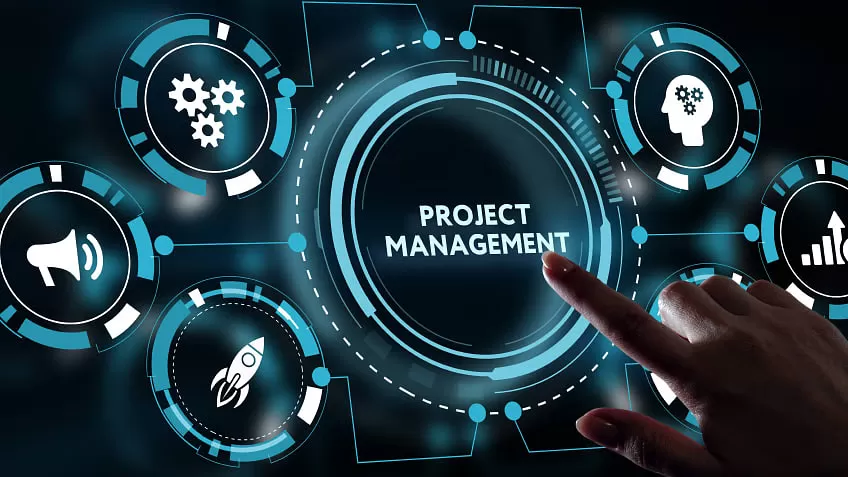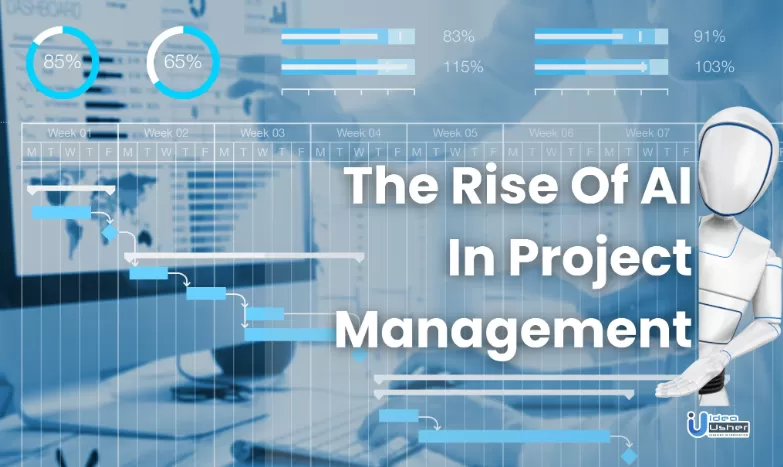Written By:
Scott McAuley
Scott is the IT Director of Texas Management Group, and has been in the IT industry for 25 years.
Imagine a world where project deadlines are always met, resources are optimized effortlessly, and risks are managed with precision. This isn’t just a dream—it’s the power of AI in Project Management.
As artificial intelligence revolutionizes industries, its impact on project management is nothing short of transformative. In this article, we’ll explore the top 10 benefits of integrating AI into your project workflows.
From automating mundane tasks to enhancing decision-making and predicting project outcomes, AI is reshaping how teams operate and succeed.
Ready to unlock the future of project management? Let’s dive into how AI can turn your project challenges into triumphs and give you a competitive edge.
Key Takeaways
- AI optimizes resource allocation by predicting needs, ensuring efficient use of resources, reducing waste, and increasing project success rates.
- Predictive analytics improve decision-making by forecasting potential delays and risks, enabling project managers to take proactive measures.
- Task scheduling becomes automated with AI, ensuring deadlines are met by efficiently assigning tasks based on dependencies and team availability.
- AI enhances communication through tools that streamline collaboration, provide real-time updates, and automate information sharing across project teams.
- AI-driven performance monitoring continuously tracks project metrics, providing insights for optimization and ensuring projects stay on track.
Table of Contents
What is Project Management?

Project management is the systematic process of leading a team to achieve specific goals within a defined timeframe.
It involves planning, organizing, and managing resources to complete tasks efficiently, ensuring that objectives are met according to predetermined criteria like budget, scope, and quality.
At its core, project management is about making things happen. A project manager defines clear steps, assigns responsibilities, and keeps the team focused, all while managing risks and ensuring stakeholder alignment.
This process applies across industries, from construction to software development, and even to creative fields like marketing or event planning.
Key components of project management include:
- Scope Management: Defining the project’s boundaries and deliverables.
- Time Management: Scheduling activities and managing deadlines.
- Cost Management: Keeping the project within budget.
- Quality Management: Ensuring that the end result meets expectations.
- Communication Management: Facilitating clear communication among team members and stakeholders.
- Risk Management: Identifying potential challenges and mitigating them proactively.
How AI Will Transform Project Management?
Artificial intelligence (AI) is set to revolutionize project management. It will use intelligent automation for task management and deep learning for resource optimization.
Better Selection and Prioritization
AI will change project management by improving how projects are selected and prioritized. It analyzes vast data from past projects to spot patterns and insights.
For a software company, AI-driven prioritization can help in selecting projects that align best with strategic goals and resource availability.
Support for the Project Management Office
AI will support the Project Management Office (PMO) by automating routine tasks and offering smart advice.
For instance, AI tools can help with assigning resources by matching them with the right projects based on their skills and availability.
Improved, Faster Project Definition, Planning, and Reporting
AI will speed up project definition, planning, and reporting. It can create project charters and define scope by analyzing past data.
Virtual Project Assistants
AI-powered virtual project assistants will become more common. They provide on-demand support and guidance to managers and team members.
Tasks like scheduling meetings and answering project questions will be handled by these assistants, freeing up managers for strategic work.
Advanced Testing Systems and Software
AI will change testing in project management. Advanced systems and software can automatically create test cases and find defects.
A New Role for the Project Manager
As AI takes over routine tasks, project managers will focus more on strategy and innovation. They’ll need to learn about data analysis and AI to use these technologies fully.
10 Types of AI in Project Management
AI has transformed project management by introducing various techniques and technologies. These enhance efficiency, productivity, and decision-making.
Here are ten types of AI that are changing how projects are managed:
| AI Technique | Application in Project Management |
|---|---|
| Machine Learning | Resource optimization, risk prediction, data-driven decision-making |
| Deep Learning | Predicting project delays, identifying bottlenecks, optimizing project schedules |
| Supervised Learning | Quality control, defect identification, ensuring deliverable standards |
| Unsupervised Learning | Pattern recognition, identifying project clusters, discovering task dependencies |
| Reinforcement Learning | Optimizing project schedules, resource allocation, risk mitigation strategies |
| Natural Language Processing | Sentiment analysis, automatic report summarization, intelligent chatbots |
| Computer Vision | Progress monitoring, safety compliance checks, quality inspections |
| Generative Adversarial Networks | Generating project scenarios, simulating outcomes, creating virtual environments |
| Expert Systems | Decision support, risk assessment, resource allocation, issue resolution |
| Robotic Process Automation | Automating data entry, report generation, invoice processing |
1. Machine Learning (ML)
Machine Learning algorithms analyze historical data to identify patterns and predict future outcomes. This helps project managers optimize resource allocation and predict project risks.
By using artificial neural networks for resource optimization, managers can allocate resources effectively, reducing waste and maximizing productivity.
2. Deep Learning
Deep Learning, a subset of ML, uses artificial neural networks to model and solve complex problems. It enables project managers to tackle intricate challenges, such as predicting project delays and optimizing project schedules.
Deep Learning algorithms process vast amounts of data, uncovering hidden patterns that human analysts might miss.
3. Supervised Learning
Supervised Learning involves training models on labeled data to make predictions or decisions. In project management, it’s applied for quality control. Models are trained on historical data to identify defects or anomalies.
4. Unsupervised Learning
Unsupervised Learning finds hidden patterns or intrinsic structures in unlabeled data. It’s used for pattern recognition in project management, such as identifying similar projects or dependencies between tasks.
5. Reinforcement Learning
Reinforcement Learning trains models to make decisions based on rewards and punishments. In project management, it optimizes project schedules, resource allocation, and risk mitigation strategies.
By learning from past experiences, reinforcement learning algorithms adapt to changing project conditions, aiding in optimal decision-making.
6. Natural Language Processing (NLP)
Natural Language Processing enables machines to understand, interpret, and generate human language.
In project management, NLP is used for sentiment analysis, automatic summarization of reports, and intelligent chatbots for communication. It facilitates effective communication and helps gather insights from unstructured data.
7. Computer Vision
Computer Vision allows machines to interpret and understand visual information. In project management, it’s applied for progress monitoring, safety compliance checks, and quality inspections.
Automating visual tasks reduces manual effort and improves accuracy.
8. Generative Adversarial Networks (GANS)
Generative Adversarial Networks create new data instances that resemble the training data. In project management, GANS generate realistic project scenarios, simulate outcomes, and create virtual environments for training and testing.
9. Expert Systems
Expert Systems emulate the decision-making ability of a human expert in a specific domain. In project management, they assist in making complex decisions, such as risk assessment and resource allocation.
By capturing the knowledge of experienced project managers, expert systems provide valuable insights and recommendations.
10. Robotic Process Automation
Robotic Process Automation automates repetitive and rule-based tasks. In project management, it’s used for tasks like data entry, report generation, and invoice processing.
By eliminating manual effort and reducing errors, RPA improves efficiency and allows project managers to focus on higher-value activities.
10 Benefits of AI in Project Management
AI in project management revolutionizes how teams operate, bringing efficiency, accuracy, and scalability to project workflows.
By leveraging AI, project managers can streamline processes, enhance decision-making, and improve overall project outcomes.
Here are the 10 Benefits of AI in Project Management:
| Benefit | Description |
|---|---|
| Resource Allocation | Optimizes the use of resources by predicting needs and assigning them where they are most needed. |
| Predictive Analytics | Provides insights based on data trends to forecast project timelines and potential roadblocks. |
| Task Scheduling | Automates scheduling, ensuring tasks are assigned and completed on time. |
| Cost Estimation | Enhances accuracy in budgeting by analyzing past project data and current market trends. |
| Document Management | Streamlines the organization and retrieval of project documents. |
| Communication Enhancement | Improves team communication with AI-driven tools for collaboration and information sharing. |
| Quality Control | Uses AI to monitor project quality and ensure standards are met throughout the process. |
| Risk Management | Identifies and mitigates potential risks using predictive modeling and analytics. |
| Scalability | Allows projects to scale efficiently by automating repetitive tasks and processes. |
| Performance Monitoring | Continuously tracks project performance and provides real-time feedback for improvements. |
1. Resource Allocation
AI optimizes resource allocation by analyzing project requirements, timelines, and team skills, predicting the necessary resources for each task. This leads to better resource management, reduced costs, and increased project efficiency.
2. Predictive Analytics
AI uses historical data to predict future outcomes, such as project timelines, potential delays, and resource needs.
This helps project managers make informed decisions, improve planning accuracy, and proactively address potential issues.
3. Task Scheduling
AI automates the scheduling of tasks by analyzing dependencies, team availability, and project deadlines.
It creates optimized schedules that ensure timely task completion, reducing the burden on project managers and helping maintain project timelines.
4. Cost Estimation
AI analyzes past project data and current market trends to provide accurate cost estimates, considering various factors such as labor, materials, and time.
Enhanced cost estimation accuracy helps in budgeting, reducing the likelihood of cost overruns.
5. Document Management
AI streamlines document management by categorizing, storing, and retrieving project documents efficiently, using natural language processing to understand and organize them.
This improves document accessibility, reduces time spent searching for information, and ensures team members have access to the latest project documents.
6. Communication Enhancement
AI-driven tools facilitate team communication and collaboration by automating updates, providing real-time feedback, and integrating communication platforms.
Improved communication leads to better team coordination, faster issue resolution, and increased productivity.
7. Quality Control
AI monitors project quality by analyzing data from various sources and identifying deviations from standards, providing real-time alerts and suggestions for corrective actions.
This ensures that quality standards are maintained throughout the project, reducing defects and improving overall project outcomes.
8. Risk Management
AI identifies potential risks by analyzing project data, market conditions, and historical trends, providing risk assessments and mitigation strategies.
Proactive risk management helps minimize project disruptions and enhance the likelihood of project success.
9. Scalability
AI enables projects to scale efficiently by automating repetitive tasks, managing large volumes of data, and adapting to changing project needs.
This allows organizations to handle larger and more complex projects without a proportional increase in resources or time.
10. Performance Monitoring
AI continuously tracks project performance by analyzing key metrics and providing real-time feedback, identifying areas for improvement and suggesting optimizations.
Continuous performance monitoring leads to ongoing improvements, ensuring that projects stay on track and meet their goals.
5 Drawbacks of AI in Project Management
While AI offers significant advantages in project management, it also presents challenges that can impact its effectiveness and reliability.
Understanding these drawbacks is essential for mitigating risks and optimizing AI integration in projects.
Here are the Drawbacks of AI in Project Management:
| Drawback | Description |
|---|---|
| Misinformation and Bias | AI can propagate existing biases in data, leading to skewed results and decision-making. |
| Errors and Lack of Accountability | Automated systems can make errors without clear accountability for those mistakes. |
| Security Concerns | AI systems can be vulnerable to cyberattacks, compromising project data and operations. |
| Dependency on Quality and Quantity of Data | AI effectiveness is heavily reliant on the quality and volume of input data. |
| Integration and Adoption Challenges | Implementing AI can be complex and may face resistance from team members. |
1. Misinformation and Bias:
AI systems can inherit and amplify biases present in training data, leading to skewed results and potentially discriminatory decisions.
Solution: Implement rigorous data review processes, use diverse datasets, and regularly audit AI systems to detect and correct biases.
2. Errors and Lack of Accountability
Automated systems can make errors, and it may be difficult to determine who is responsible for these mistakes, leading to accountability issues.
Solution: Establish clear guidelines for AI use, maintain human oversight, and create accountability frameworks to ensure errors are addressed promptly and responsibly.
3. Security Concerns
AI systems can be targets for cyberattacks, which can compromise sensitive project data and disrupt operations.
Solution: Implement robust cybersecurity measures, including encryption, regular security audits, and continuous monitoring to protect AI systems from threats.
4. Dependency on Quality and Quantity of Data
The effectiveness of AI is heavily reliant on the quality and quantity of input data. Poor data can lead to inaccurate predictions and decisions.
Solution: Ensure data quality through thorough data cleaning and validation processes. Use comprehensive datasets to train AI models for better accuracy.
5. Integration and Adoption Challenges
Implementing AI can be complex, requiring significant changes to existing processes and potential resistance from team members.
Solution: Provide comprehensive training for team members, involve them in the implementation process, and demonstrate the benefits of AI to gain buy-in and facilitate smooth integration.
Will AI Replace Project Managers?
As artificial intelligence (AI) advances, it’s reshaping industries, including project management. But will AI replace project managers? The straightforward answer is no.
Human Skills Remain Irreplaceable:
Despite these technological advances, the human element in project management remains indispensable:
- Strategic Thinking: AI lacks the ability to navigate complex business strategies.
- Decision-Making: Critical, nuanced decisions require human judgment.
- Stakeholder Management: Managing relationships and conflicts is inherently human.
- Innovation: Creativity and innovation thrive on human ingenuity.
Future Role of Project Managers:
While AI may automate up to 80% of routine project management tasks by 2030, this doesn’t spell the end for project managers.
Instead, their roles will evolve to focus more on areas requiring human expertise and emotional intelligence.
Project managers will oversee AI integration, coach teams, and manage stakeholder relationships using AI insights to drive success.
Conclusion
AI is revolutionizing project management, transforming how teams operate and succeed. By automating routine tasks and predicting outcomes, AI provides a competitive edge and improves efficiency across all project stages.
To harness these benefits, start integrating AI tools tailored to your project needs and upskill your team to manage this technological transition.
Dive into the world of AI in project management today, and transform your project outcomes from challenges into triumphs.
Ready to elevate your projects? Start your AI journey now and join the discussion on how AI is shaping the future of project management.
Want a Competitive Edge in Project Management with AI?
Review our blogs for the top ways AI enhances project workflows and accuracy. Our IT software solutions can implement AI solutions customized for your team’s goals.
Contact us now to revolutionize your project approach!
FAQ
How is AI Used in Project Management?
AI is used in project management to automate routine tasks, analyze project data, predict risks, and optimize resource allocation, enhancing efficiency and decision-making.
How Does Artificial Intelligence Integrate with Project Management?
Artificial Intelligence integrates with project management through tools that assist in scheduling, task prioritization, data analysis, and predictive analytics, providing insights and automating workflows.
Can AI Create a Project Plan?
Yes, AI can generate project plans by analyzing requirements and historical data to propose schedules, tasks, and resource allocations, often offering recommendations for optimization.
How to Use Generative AI in Project Management?
Generative AI can be used to draft project documentation, generate status reports, suggest solutions to potential issues, and automate content creation related to project management tasks.






